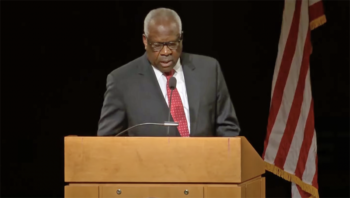By Mark Ellis —

Supreme Court Justice Clarence Thomas openly discussed his faith in a lecture at Notre Dame September 16th delivered to students, faculty and others from the community.
Thomas cited his grandparents and the teachers at his parochial school as the people who most influenced his life. They accomplished this by “living out their sacred vocation in a time of stark racial animus,” a task he said they performed “with dignity and with honor,” according to a report by Aleteia.
His grandmother was Baptist and his grandfather was Catholic. “The single biggest event in my early life was going to live with my grandparents in 1955,” he noted.
Because of their belief in each person’s God-given worth, “not only did we deserve to be treated equally, but we also were required to conduct ourselves as children of God. Hence, we were to live our lives according to his Word. My grandparents repeatedly stressed that because of our fallen nature we had to earn our bread by the sweat of our brows.
“There was no room to doubt this and even less for self-pity. As they saw things, on judgment day we would be held accountable for the use of our God-given talents and our opportunities.”
Thomas said his parochial school teachers were “devout, courageous and principled women.”
In second grade, his class of 40 children would recite in unison:
“God created me to know love and serve him in this life and to be happy with him in the next.”
As Thomas grew into adulthood he pondered the meaning of life and decided he has “yet to hear a better explanation of why we are here.”
Growing up in a time of racial segregation, a Christian worldview gave Thomas an important perspective. “Because I am a child of God there is no force on this earth that can make me any less than a man of equal dignity and equal worth,” he said. This truth was “repeatedly restated and echoed throughout the segregated world of my youth” and “reinforced our proper roles as equal citizens, not the perversely distorted and reduced role offered us by Jim Crow.”
Justice Thomas briefly attended seminary, but after the assassination of Martin Luther King Jr. in 1968 he left after he heard a disparaging remark about King from a fellow student. After the shooting, the student said: “Good, I hope the son of a b____ died.”
The remark caused him to stop attending church and drift from his faith.
“Indeed, that was why I left the seminary in May of 1968. I let others and my emotions persuade me that my country and my God had abandoned me. I became disoriented and disenchanted with my faith and my country and deeply embittered, and perhaps worst of all, I let my family down,” he said.
At the age of 19, his grandfather asked him to leave his house. After transferring to the College of the Holy Cross in Massachusetts he said he “fell in quickly with radical ideologies such as Black Power. It was an era of disenchantment and deconstruction. The beliefs of my youth were subjected to the jaundiced eye of critical theories or, perhaps more accurately, cynical theories.”
Thomas became disillusioned with the Black Power movement, which he realized was “self-defeating.”
“The wholesomeness of my childhood had been replaced with emptiness, cynicism and despair,” he said. He slowly recognized there were no greater truths than what his grandparents and teachers taught him: “We are all children of God and rightful heirs to our nation’s legacy of civic equality. We were duty-bound to live up to obligations of the full and equal citizenship to which we were entitled by birth.”
Studying the history of the United States confirmed the godly certainties of his grandparents and teachers. The “self-evident” truths of the Declaration, he said, were “beyond dispute” in his own upbringing.
“As I rediscovered the God-given principles of the Declaration and our Founding, I eventually returned to the Church, which had been teaching the same truths for millennia,” he said. Reportedly, his return to church happened in the mid-1990s after his appointment as a Supreme Court Justice.
In his address, Thomas reflected on his friendship with the late justice Antonin Scalia. Even though they had different backgrounds, a shared faith, school experience, and culture led them to analyze the law from a similar perspective.
Thomas knows Supreme Court Justice Amy Barrett from her time as a clerk for Scalia. “I pray that she has a long and fruitful tenure on the court,” he said.
If you want to know more about a personal relationship with God, go here




Mark- thank you for writing and sharing the personal story of Justice Clarence Thomas.
Well done!
John Eskel
Comments are closed.